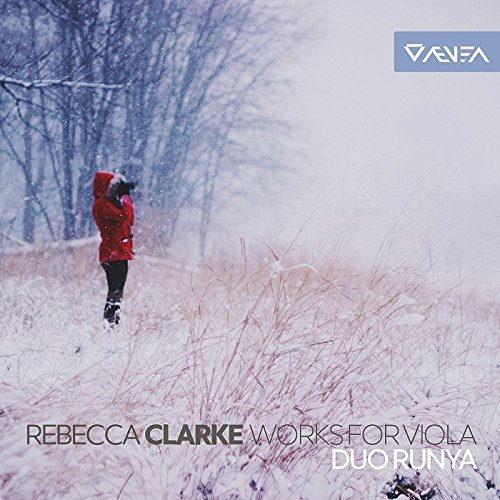R CLARKE Works for Viola
View record and artist detailsRecord and Artist Details
Composer or Director: Rebecca Clarke
Genre:
Chamber
Label: Vaeva
Magazine Review Date: 05/2016
Media Format: CD or Download
Media Runtime: 68
Mastering:
DDD
Catalogue Number: AE16008

Tracks:
| Composition | Artist Credit |
|---|---|
| Sonata for Viola and Piano |
Rebecca Clarke, Composer
Duo Rúnya Rebecca Clarke, Composer |
| Lullaby |
Rebecca Clarke, Composer
Duo Rúnya Rebecca Clarke, Composer |
| Untitled Piece |
Rebecca Clarke, Composer
Duo Rúnya Rebecca Clarke, Composer |
| Chinese Puzzle |
Rebecca Clarke, Composer
Duo Rúnya Rebecca Clarke, Composer |
| Passacaglia on an Old English Tune |
Rebecca Clarke, Composer
Duo Rúnya Rebecca Clarke, Composer |
| I'll bid my heart be still |
Rebecca Clarke, Composer
Duo Rúnya Rebecca Clarke, Composer |
| Morpheus |
Rebecca Clarke, Composer
Duo Rúnya Rebecca Clarke, Composer |
| Dumka |
Rebecca Clarke, Composer
Duo Rúnya Rebecca Clarke, Composer |
Author: Hannah Nepil
Hers is an alluring compositional voice that works on many levels. There’s the dreaming, whimsical side, the uncompromising grasp of structure, the impressionistic fascination with image. Then there’s a quality that often pulls us up short: namely a fearless intensity. What she lacks is a strong sense of individuality; at points you wish the real Clarke would step forward, so closely does her musical language mirror Bridge’s, Ravel’s, Debussy’s.
Nonetheless, this portrait of her chamber works from Duo Rùnya is a welcome novelty. From the impetuous opening of the Viola Sonata, the Italian sisters Diana and Arianna Bonatesta never shy away from extremes – but nor do they underestimate the work’s subtlety. They relish the dreamy lyricism in the first movement, the delicacy of the elfish Scherzo. Most of all they relish the sense of journey, the tautness of Clarke’s musical argument. Just occasionally, it’s too much of a scramble: Diana’s viola-playing lacks the effortlessness of, say, Tabea Zimmermann’s or the gloss factor of Philip Dukes’s. Where she triumphs over Dukes, though, is in her imaginative range.
It’s a quality that pays off in the gem-like shorter pieces, where she manages to crystallise every character: the dreaminess of the Lullaby and the exoticism of the Chinese Puzzle, underlined by her sister’s translucent touch. Throughout, both performers are amazingly light on their feet, but I sense that they’re most at home in music of greater scope and depth. Morpheus, inspired by the Greek god of dreams, is strikingly Debussian, while Dumka draws on the Slavic tradition, exploited, most famously, by Dvořák. On the surface, then, quite different, but both are intensely elegiac – a fitting closing statement from a composer who felt compelled to bill some of her work under a man’s name, and found that it indeed sold better than under her own.
Discover the world's largest classical music catalogue with Presto Music.

Gramophone Digital Club
- Digital Edition
- Digital Archive
- Reviews Database
- Full website access
From £8.75 / month
Subscribe
Gramophone Full Club
- Print Edition
- Digital Edition
- Digital Archive
- Reviews Database
- Full website access
From £11.00 / month
Subscribe
If you are a library, university or other organisation that would be interested in an institutional subscription to Gramophone please click here for further information.




